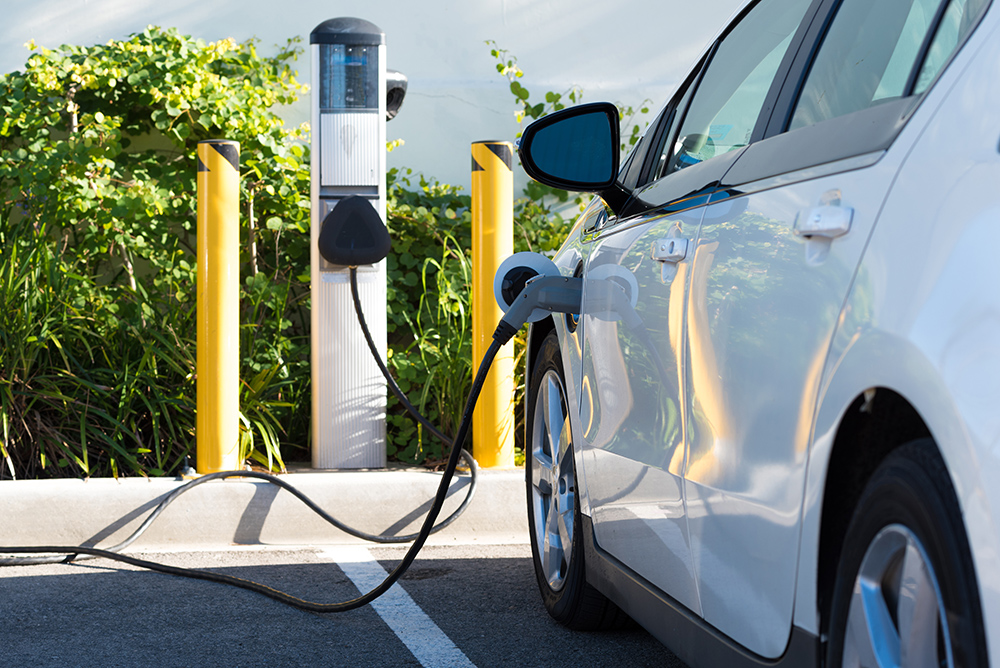September 2, 2021
Public Service Company of New Mexico (PNM) is in the process of obtaining approval from the New Mexico Public Regulation Commission (PRC) for a transportation electrification plan that would provide economic and environmental benefits for New Mexicans, including low- and moderate-income residents, and help the state reduce the fossil fuel pollution that causes climate change and poor air quality. PNM and several other utilities across the West have developed transportation electrification plans in the past year to accelerate adoption of electric vehicles and build the charging infrastructure needed to serve those vehicles.
Many major automakers are recognizing that the future is electric, investing billions of dollars in research and development, producing more diverse models of electric vehicles, and even committing to sell only electric models in the future. New Mexico Governor Michelle Lujan Grisham recently announced plans to adopt a Zero-Emission Vehicle standard by spring 2022. Those rules would require a certain percentage of low- and zero-emission cars to be sold in the state. Colorado already adopted a standard, and Nevada is preparing to put one in place by the end of this year.
Concern about lack of public charging stations is often cited as the main barrier that keeps drivers from switching to electric. Incentives like those provided in PNM’s transportation electrification plan will be critical for New Mexico and other states across the Interior West to overcome concern over the lack of public charging stations and realize the economic and environmental benefits of clean transportation.
PNM’s original proposal includes about $8.5 million to assist customers with installing charging stations at their homes or businesses and for an outreach campaign to educate people about electric vehicles. Within that proposed budget for incentives, 25% is dedicated to low- and moderate-income customers, the highest proportion of any utility transportation electrification plan in the region.
After reviewing parties’ testimony in the proceeding, the New Mexico PRC’s hearing examiner on Aug. 31 made her recommended decision. The PRC will evaluate this recommended decision and determine whether it wants to make additional changes. While the hearing examiner made some adjustments in response to WRA’s positions, we plan to continue to advocate that PNM be required to expand the budget to nearly $11 million to provide greater assistance to customers in multi-family housing complexes and single-family homes, and to facilitate a more rapid build out of public fast chargers.
PNM’s transportation electrification plan features a variety of rebates and incentives designed to increase electric vehicle charging infrastructure across the state and encourage greater use of electric vehicles:
- The residential rebate program includes $1.5 million for 3,000 rebates of $500 each for customers to install electric vehicle chargers in their homes. The chargers must meet certain standards and customers must take service on a residential electric vehicle rate for electricity service. WRA has recommended increasing the number of rebates to 5,000. The recommended decision proposes increasing the number of rebates to 3,900 so that half of PNM’s expected EV customers can receive a rebate.
- The plan includes $225,000 for 150 rebates of up to $1,500 to help low- to moderate-income customers install at-home charging stations. The recommended decision increases these rebates to $2,000 per station for low- to moderate-income customers, a position WRA supported.
- The nonresidential rebate program includes $1.75 million for 70 DC fast charging rebates of $25,000 each. These chargers must be at least 50 kilowatts each, accessible to the public, and feature a chip reader. The charging station owners must enroll in a nonresidential time-of-use rate for electricity service. WRA has recommended that this rebate be increased to $35,000 to be more consistent with industry best practices nationwide and spur higher levels of participation in the program, to ensure a more rapid build out of public fast charging stations. The recommended decision does not increase the scale of these DC fast charging rebates.
- Another $450,000 is set aside to provide 90 rebates of $5,000 each for Level 2 electric vehicle charging stations that are accessible to the public and feature a chip reader.
- A workplace charging station incentive program has a budget of $450,000 for 90 rebates of $5,000 each for employers who want to install electric vehicle charging that would be accessible only to their employees and fleet vehicles.
- A multi-family housing charging incentive has a $100,000 budget for 20 rebates of $5,000 each for low-income multi-family housing chargers. WRA has recommended that PNM increase the program to $960,000 to allow for 80 rebates of $12,000 each. WRA recommended that PNM maintain 20 of these chargers exclusively for low-income multi-family housing units and also make 60 available for multi-family housing complexes of any income level. The recommended decision triples the size of PNM’s multi-family housing program by creating a program for multi-family housing complexes of any income level, with 40 rebates of $2,500 each, as well as doubling the amount of the rebates for low-income multi-family housing complexes to up to $10,000 each.
- The plan earmarks $1.5 million for a mass transit infrastructure program that includes en route and depot electric vehicle chargers that interface with mass transit stations and systems.
The transition to electric vehicles provides substantial economic, environmental, and public health benefits, and the faster the transition occurs, the faster those benefits will be realized by our communities. When those vehicles are powered by clean electricity, they can help us make substantial progress in curbing carbon pollution to address climate change. WRA works with utilities, state legislatures, and regulators to build and obtain regulatory approval of transportation electrification plans that will make this clean transportation future a reality in the Interior West.



